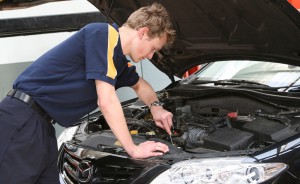Refine Results
New optimism for Australia’s automotive industry
Next month will mark one year since Ford announced that it would close its Australian manufacturing plants. That announcement kicked off a horror twelve months for the automotive manufacturing industry in this country – but a new report from Auto Skills Australia is optimistic that there’s light at the end of the tunnel.
Auto Skills Australia CEO Geoff Gwilym says “There won’t be a collapse of the industry. It will be leaner, but it will also be more progressive and better positioned for the future of the sector. We foresee a lean, capable and modern industry going forward.”
Despite the looming closures of the Ford, Holden and Toyota plants, in 2012/13 net employment in the automotive sector actually increased. Gwilym points out that manufacturing only comprises 13% of the automotive industry and manufacturing job losses should be absorbed within other areas of the automotive sector.
“Our report shows that employment gains within car and parts wholesaling, repair and maintenance and tyre retailing has more than compensated for declines in employment within car and component manufacturing.”
Across the industry there were an additional 4,132 jobs created as repair and wholesale retailers continued to perform well. Since the number of cars owned by Australians continues to grow by almost half a million each year, retailers and repairers will continue to be in high demand.
Auto Skills Australia found that many businesses were expecting growth in the next 12 months. “The industry is growing on average by 400,000 vehicles on the road each year and the industry needs to be capable of servicing and maintaining this growing fleet,” Gwilym says. “At the moment growth in the non-manufacturing side of the industry is outpacing any decline.”
 In fact, the report identifies a national shortage of 21,175 workers in key skills areas of the car industry. “So while manufacturing is facing tough times, retail, services and repairs represents the biggest part of the industry and it’s searching for workers to maintain the nation’s growing vehicle fleet. There already are many innovative small businesses in this respect and it’s the ones which don’t keep up with investment in new equipment and up-skilling requirements which will fall by the wayside,” he says
In fact, the report identifies a national shortage of 21,175 workers in key skills areas of the car industry. “So while manufacturing is facing tough times, retail, services and repairs represents the biggest part of the industry and it’s searching for workers to maintain the nation’s growing vehicle fleet. There already are many innovative small businesses in this respect and it’s the ones which don’t keep up with investment in new equipment and up-skilling requirements which will fall by the wayside,” he says
The automotive industry’s contribution to Australia’s GDP remained stable at 2.6%, equating to around $38.4 billion.



